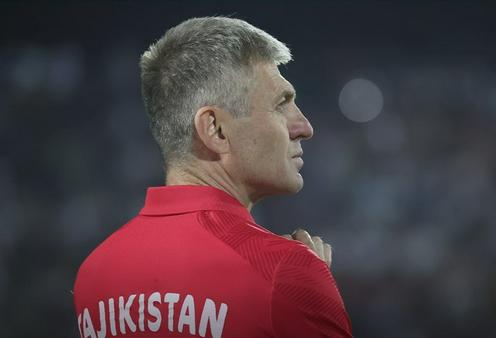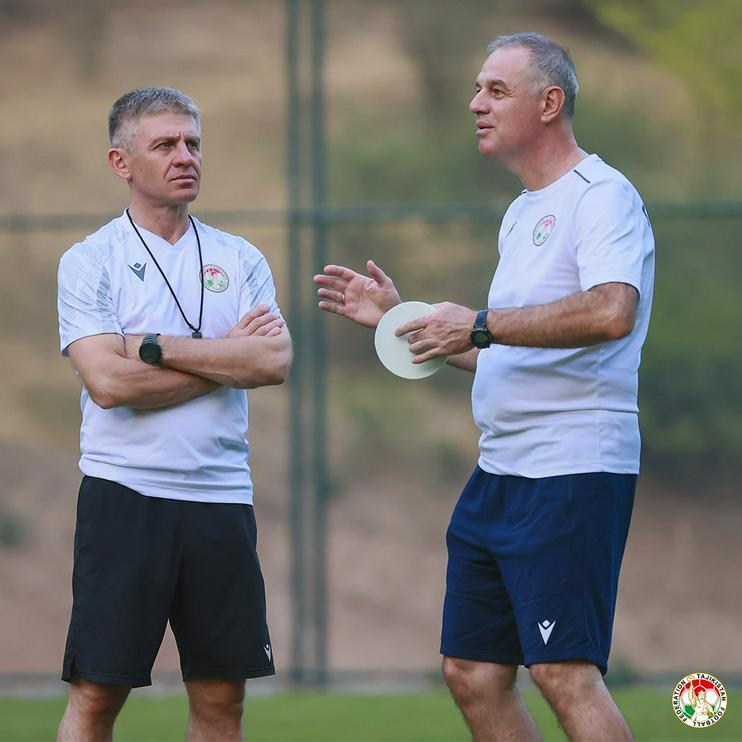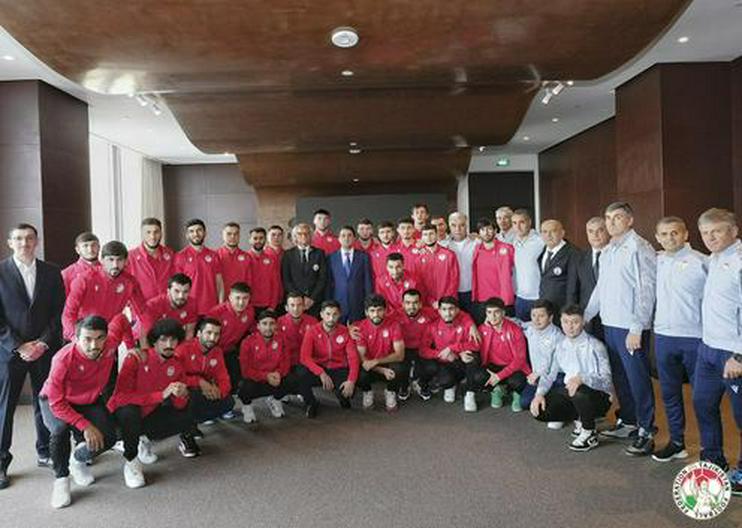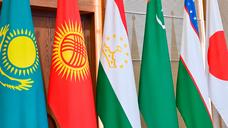On September 10, after Tajikistan’s U-23 national team lost to Jordan in Asian Cup qualifying, the entire coaching staff of the senior and Olympic squads, led by Georgian specialist Gela Shekiladze, was dismissed. Just a few days later, on September 14, Shekiladze celebrated his 55th birthday, and the very next day he gave a detailed interview to Fergana, summing up nearly four years in Tajik football and explaining the reasons behind his resignation.
Gela Shekiladze’s playing career came during a turning point for Georgian football. A tough defender without flair or showy technique, he was remembered by fans for his rough, no-nonsense style of play, often skirting the edge of a foul. He was considered an awkward opponent, capable of unsettling even the most skillful strikers. He played at a time when Georgia’s national team was experiencing its “golden era.” In 22 matches for the national side, Shekiladze took the field alongside Kakha Kaladze, Shota Arveladze, Georgi Demetradze, and other stars who defined the team in the late 1990s and early 2000s. Compared with his more flamboyant teammates, he remained the “workhorse” of the defense, where reliability and efficiency mattered more than spectacle.
Shekiladze began his club career at Dinamo Batumi, where he quickly became one of the team’s leaders. He then moved to Belgian side Lierse, with whom he won both the national Cup and Super Cup. Later, he played in Ukraine for Arsenal Kyiv and CSKA Kyiv.
After retiring as a player, he turned to coaching, working with Georgia’s youth national teams across different age groups, where he earned a reputation as a coach able to get the most out of limited resources. Dozens of well-known Georgian players came through under his guidance. It was during this period that he met German-Croatian coach Petar Segrt, who became his friend, colleague, and mentor.
Together, they began with Georgia’s under-21 team before moving on to Asia. They first worked in the Malaysian league, then took charge of the national teams of Afghanistan and the Maldives, where they achieved results that were considered phenomenal by local standards. Under Segrt and Shekiladze, Afghanistan opened with five straight wins, reached the final of the South Asian Football Federation Championship, and lost to India only by the narrowest of margins. Later, the team managed a draw against Malaysia. The Maldives, long regarded as outsiders in Asian football, were transformed under their leadership: in their first seven matches, the team won four, including a historic first-ever victory over India, and pushed stronger opponents, losing narrowly to the Philippines and Syria.
In 2022, Segrt and Shekiladze took over the Tajikistan national team. Despite criticism after a poor start and a disappointing CAFA Cup, they succeeded in leading the team to the Asian Cup for the first time, and sensationally reached the quarterfinals of the tournament, leaving China and the UAE behind.
After the championship, Segrt stepped down, passing the team to his assistant. Shekiladze then faced the difficult task of leading the side in World Cup qualification. Progressing further proved impossible, but his team held their own against Jordan and, in a historic first, drew against Saudi Arabia.
Following a series of mixed results in friendlies, Tajikistan began its campaign for the 2027 Asian Cup qualifiers: they played away against main rivals the Philippines and defeated East Timor. After two rounds, the team leads the group and is the main contender for a place in the tournament.
In the recent CAFA Cup, Tajikistan failed to reach the playoffs after an unexpected loss to India, but for the first time in its history managed to draw against Iran, coming back from two goals down. The national team had never achieved anything like this before. It was the Segrt–Shekiladze duo that forced the Asian football world to take Tajikistan seriously and demonstrated that Tajik players are capable of competing on equal terms with any opponent.
— Your resignation seemed rather illogical. The national team of Tajikistan may not have reached the CAFA Cup playoffs, but it did beat Afghanistan and, for the first time in history, drew with Iran. In addition, the Tajik side is currently leading in the Asian Cup 2027 qualifiers.
— Indeed, a lot has been accomplished. I spent almost four years working with the coaching staff of Tajikistan’s national team — first as an assistant, and since last spring as head coach. I am proud to have been part of the team’s triumphs. The Federation has done a tremendous job, and the players themselves have grown. During this time, we gave more than 70 footballers a chance to prove themselves in the national squad — that’s no small number. I was often criticized for giving playing time to newcomers, as happened at the friendly tournaments in Thailand and Malaysia. Of course, sometimes this was out of necessity, as clubs would not release their players. Still, friendlies are meant for testing and building a lineup. I don’t shy away from responsibility.
As for official matches, we played six under my leadership. Two ended in defeat — against Jordan and Saudi Arabia in World Cup qualifiers. Anyone who watched those games knows that we gave everything. Perhaps we should have taken points, but luck wasn’t on our side. We managed to draw with Saudi Arabia — an excellent result. Then there was the away draw with the Philippines. We could have won, but fell just short. Nevertheless, Tajikistan’s national team still has excellent chances of qualifying for the Asian Cup.
— How were the reasons for your resignation explained?
— The main argument was Tajikistan’s unsuccessful performance at the CAFA Cup. We lost the first match to India, which kept us out of the playoffs. But it should be understood that we were not playing with an optimal lineup, since the tournament did not fall on FIFA dates. Goalkeepers Yatimov and Baklov, as well as midfielder Umarbaev, didn’t come. Just a couple of days before the start, our legionnaires from Iran and Uzbekistan joined the squad — they hadn’t fully recovered. A number of key players were called up to the Olympic team. So, we had to rotate the lineup. That didn’t allow us to win, but it gave several reserves valuable international experience.
However, as the tournament went on, we found our rhythm: we beat Afghanistan and shared points with a strong Iran. We performed better than at the CAFA Cup two years ago, when we earned only two points and were crushed by Uzbekistan. This time — four points and five goals scored. The progress is obvious.
I remember how we came back from 0–2 against Iran, how the team began to believe in itself, and the emotions that surged through the stadium. People were happy. In four years, I had never seen anything like it. And after the CAFA Cup, Tajikistan even rose two places in the FIFA rankings. And yet, after all that, I was told to step down.
— How did the players react?
— Every single one of them called or wrote to me. They all regretted it, no one was pleased. Nobody understood why we were leaving.
— The criticism from fans started quite a while ago. The most active period was after the 5–0 loss to Belarus this spring.
— I was against that match. Every year in November I submitted a training plan, where I tried to avoid scheduling games during Ramadan (the holy month for Muslims, which requires strict fasting — editor’s note, Fergana). Most of the guys observe the fast, and it is very difficult for them to play against a strong team, especially during the day. Beyond that, the focus should have been on preparing for the official match against East Timor. At that time, many players were already getting competitive practice in their foreign clubs.
In general, after the Asian Cup in Qatar there was a bit of a downturn. Everything added up. But the Belarus match was scheduled, and I was simply presented with a fait accompli. Much more important, however, is that we won the official match and prepared several players for their clubs. It was right after the Timor game that Vahdat Hanonov was brought back into the starting lineup at Sepahan.
— You also worked with the Olympic team, which failed to qualify for the Asian Cup.
— Although Levan Khomeriki was the head coach, we prepared the team together, since it was I who put forward his candidacy. He is an excellent specialist. For nine months we lived in Dushanbe, watched almost every club match, and studied potential candidates. I brought young players into the senior team so they could gain international experience. The Olympic squad hadn’t been assembled for a long time and had no official matches. During that period we managed only a few friendlies: we drew with Kyrgyzstan and beat India. That wasn’t enough. A planned trip to China also fell through.
Just before the tournament, it turned out that Ansor Khabibov and Aleksandr Mukhin couldn’t reach agreements with their clubs. The guys were upset. During the tournament, Amadoni Kamolov — one of our key players — was injured and missed the matches against the Philippines and Syria. And our player pool was already limited. But I firmly believed until the end that the team could advance from the group. We created a competitive environment and brought in players from the Tajikistan league. We started well, crushing Nepal, but then suffered frustrating losses to the Philippines and Syria. The team controlled the matches and created chances, but the old rule kicked in: if you don’t score, your opponent will.
— To what extent were you involved in the Olympic team’s affairs?
— Khomeriki and I worked together on scouting, training, and planning. I value his opinion highly. The entire staff supported him, so I take responsibility myself.
— Don’t you think you took on too much?
— There was no other choice. The team had to be prepared in a short period of time. I needed someone I trusted, who understood my philosophy. Many Olympic team players were also involved with the national squad. An outsider likely wouldn’t have managed. Formally, Levan was responsible for the results, as he himself said. My responsibility was moral. We’re friends, and both of us apologized to the fans for the Olympic team’s failure.
— Some say Khomeriki’s appointment was tied to financial problems at the Tajikistan Football Federation.
— It’s hard for me to assess the Federation’s budget; that’s not my concern. But none of us received money for our work with the Olympic team. We didn’t even raise the question. For me, the passion for the game mattered more. I very much wanted to see both teams at the Asian Cup.
— Ahead are matches against the Maldives, where you once worked with Petar Segrt.
— Yes, I know that team very well. I had a plan ready. They may be considered outsiders, but at times they are very stubborn opponents. They can’t be underestimated. Then comes Timor, another familiar opponent. And in the spring, the decisive match against the Philippines. I am confident the national team will advance from the group.
— How did Petar Segrt react to your resignation?
— We’re in touch. He was shocked when he learned about it from the press. He kept asking: “How can you fire a coach after a draw with Iran?” We spoke at length, and he congratulated me on my birthday. Work is work, but relationships matter more.
— Some say Segrt may return to the Tajikistan national team.
— As far as I know, he isn’t particularly eager. But if he does decide, the situation will be different from four years ago. The people who started out with him then are no longer there. But it’s entirely his decision.
— Would you join him as an assistant with Tajikistan if he asked?
— No, that would be unprofessional. And Petar can handle it on his own.
— Will your resignation affect Georgian clubs’ interest in Tajik players?
— We always tried to support players, recommending them to clubs, including in Georgia. After Tajikistan reached the Asian Cup quarterfinals, attitudes toward our players changed. From Georgia, it’s easier to take the next step into Europe. There are good players, like Abubakr Sulaimonov and Muso Kakhkhorov. I’ll always be glad to help them.
— What is your relationship with the Tajikistan Football Federation?
— Friendly. I often visited the Federation. When we said goodbye, we hugged. I worked with real professionals there. Recently, colleagues called and said they plan to visit me in Georgia. I’m waiting — after all, everyone knows Georgian hospitality (laughs).
— How do you assess the overall level of Tajik footballers?
— Over the past four years, the level of the league has grown noticeably. Before, there was a lot of fighting spirit but little actual football. Now the teams really play football: competition has appeared, infrastructure has improved, the pitches and lighting are better. In the details, much has become far more professional. We raised the bar. And I’m very pleased about that.
-
 17 December17.12Gulshan Is the BestYoung Uzbek Karateka Becomes World Champion
17 December17.12Gulshan Is the BestYoung Uzbek Karateka Becomes World Champion -
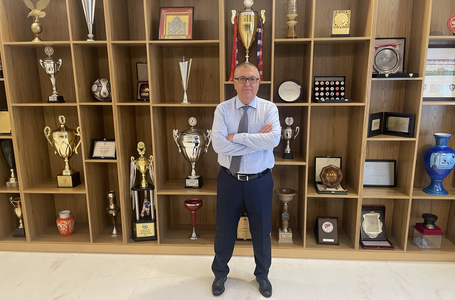 01 November01.11Catching Up with UzbekistanAlisher Aminov on the Problems of Kazakh Football and Plans to Fix Them
01 November01.11Catching Up with UzbekistanAlisher Aminov on the Problems of Kazakh Football and Plans to Fix Them -
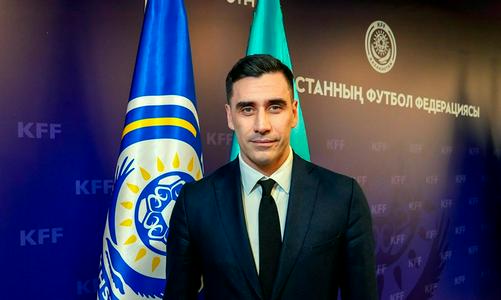 02 October02.10Football, Presidential StyleKFF Secretary General David Loria on the expansion of the Premier League, the new national team coach, and Tokayev’s role in Kazakh football
02 October02.10Football, Presidential StyleKFF Secretary General David Loria on the expansion of the Premier League, the new national team coach, and Tokayev’s role in Kazakh football -
 14 February14.02From Revolution to Rupture?Why Kyrgyzstan Dismissed an Influential “Gray Cardinal” and What May Follow
14 February14.02From Revolution to Rupture?Why Kyrgyzstan Dismissed an Influential “Gray Cardinal” and What May Follow -
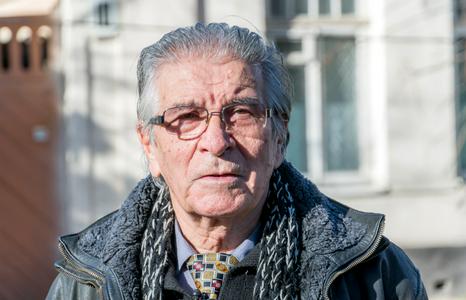 05 February05.02The “Guardian” of Old Tashkent Has Passed AwayRenowned local historian and popularizer of Uzbekistan’s history Boris Anatolyevich Golender dies
05 February05.02The “Guardian” of Old Tashkent Has Passed AwayRenowned local historian and popularizer of Uzbekistan’s history Boris Anatolyevich Golender dies -
 24 December24.12To Clean Up and to ZIYAWhat China Can Offer Central Asia in the “Green” Economy
24 December24.12To Clean Up and to ZIYAWhat China Can Offer Central Asia in the “Green” Economy
